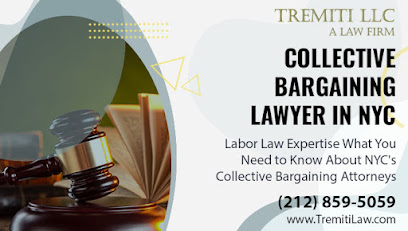New
York City, with its vibrant job market and diverse workforce, is a hotspot for
employment law challenges. From labor regulations to evolving workplace
dynamics, NYC presents unique legal complexities. To gain a deeper
understanding of the top challenges in NYC employment law, we turn to legal
experts who navigate this intricate landscape daily.
Challenge 1: Wage
and Hour Disputes
Wage
and hour disputes continue to be a top challenge in NYC employment law. According
to Emma Lawson, a seasoned NYC employment attorney, "Navigating New York's
complex wage and hour laws can be daunting for both employers and employees.
The state sets a higher minimum wage than the federal standard, and compliance
with overtime and meal break regulations can be a minefield."
To
address these issues, employers must ensure meticulous record-keeping and
adhere to state and city-specific regulations. Legal experts emphasize the
importance of wage transparency and clear compensation policies to mitigate
disputes.
Challenge 2:
Workplace Discrimination
Workplace
discrimination remains a pervasive issue in NYC. Alex Rodriguez, a prominent
employment law attorney, explains, "New York City's diverse population
means that discrimination cases can involve various factors, including race,
gender, sexual orientation, and national origin. Ensuring a safe and inclusive
work environment is critical."
Employers
must proactively establish anti-discrimination policies, conduct thorough
training, and promptly address complaints. Legal experts stress the importance
of fostering a culture of diversity and inclusivity to prevent such issues.
Challenge 3:
Retaliation Claims
Employees
who report workplace misconduct or exercise their rights may face retaliation.
Mary Thompson, an expert in NYC employment law, states, "Retaliation
claims are on the rise. Employers need to be aware that taking adverse actions
against whistleblowers or those asserting their rights can lead to costly
litigation."
To
address this challenge, legal experts recommend creating a clear process for reporting
misconduct, ensuring confidentiality, and providing legal protections for
whistleblowers.
Challenge 4: Family
and Medical Leave
Complying
with federal and state family and medical leave laws, such as the Family and
Medical Leave Act (FMLA) and the New York Paid Family Leave (PFL), can be
complex for employers. Jane Parker, a leading employment attorney, notes,
"Balancing employee needs with business demands, especially in NYC where
the cost of living is high, is a significant challenge."
Employers
should familiarize themselves with these laws, offer employees clear
information about their rights, and establish policies that promote a healthy
work-life balance.
Challenge 5:
COVID-19 Regulations
The
COVID-19 pandemic introduced a new layer of complexity to NYC employment law
attorney. Sarah Barnes, an attorney specializing in labor law,
explains, "Navigating ever-changing pandemic regulations, including
vaccine mandates and remote work policies, has been challenging for both
employers and employees."
Employers
should stay informed about the latest regulations, maintain flexible workplace
policies, and communicate effectively with their workforce to ensure compliance
and safety.
Challenge 6:
Employee Misclassification
Misclassifying
workers as independent contractors rather than employees can lead to legal
consequences. Carlos Ramirez, an NYC employment law expert, warns, "NYC
has stringent rules regarding employee classification, and missteps can result
in back pay, fines, and penalties."
Legal
experts recommend that employers carefully assess the roles and
responsibilities of their workers and seek guidance to ensure accurate
classification.
Challenge 7:
Non-Compete Agreements
Non-compete
agreements have faced increased scrutiny in recent years. Maria Garcia, a legal
expert in employment contracts, explains, "NYC courts have become more
reluctant to enforce overly restrictive non-compete clauses. Drafting
agreements that strike a balance between protecting a company's interests and
an employee's career prospects can be challenging."
Employers
should work with legal counsel to create non-compete agreements that are both
fair and legally defensible.
conclusion
NYC employment law is a complex and
ever-evolving landscape. Legal experts emphasize the importance of proactive
measures, such as clear policies, ongoing training, and staying informed about
the latest regulatory changes. By addressing these challenges head-on, both
employers and employees can navigate the NYC
employment law landscape more effectively while preserving their rights and
interests.

Comments